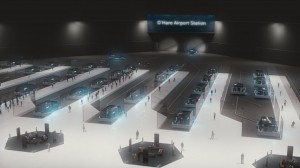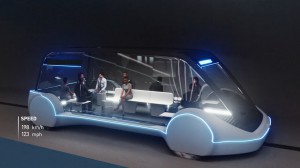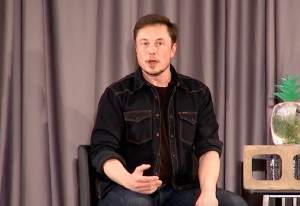
Elon Musk's The Boring Co. won the bid to build a new high-speed tunnel from downtown Chicago to O'Hare Airport.
Elon Musk’s Boring Co. has received tentative approval from the City of Chicago to build a link from downtown to its suburb-based O’Hare Airport using skateboard-like pods that could move both vehicles and individual passengers.
The Boring Co. beat out bids by a number of other transit companies, but negotiations still have to be completed before work can begin on the venture which would be privately, rather than publicly funded. It would be “transformative,” Chicago Mayor Rahm Emanuel said in a statement, and that likely goes for the new company launched by Tesla and SpaceX founder and CEO Elon Musk.
“We’re really excited to work with the Mayor and the City to bring this new high-speed public transportation system to Chicago!” the Boring Co, tweeted after the city confirmed the discussion had moved to the next phase.
The Chicago project would see Boring cut underground tunnels between some point in downtown Chicago and another location out by what is one of the busiest airports in the world. The route is currently served by a mostly above-ground rail line that takes nearly an hour. Motorists who venture onto the city’s crowded highways can be faced with drive times running up to two hours during busier parts of the day.
(Musk gets preliminary approval for testing tunnel in L.A. Click Here for the story.)

The Boring Co.'s plans in Chicago include passenger pods to take people and their luggage to O'Hare Airport.
The Boring Co. has promised to cut that down to about 12 minutes, however, with departures as frequently as every 30 seconds for 20 hours a day, seven days a week.
Those aiming to travel between downtown and O’Hare would have two options. Cars would enter elevators and be loaded onto skateboard-like platforms using an electric propulsion system similar to what is found in today’s Tesla vehicles. Alternatively, the Boring Co.’s website explains, as many as 16 individual passengers could enter a train car-like version of the pods. Each would be climate-controlled and offer space for luggage, as well as a WiFi link travelers could use along the route.
Tunnel work for traditional rail systems is generally predicted to cost around $1 billion a mile. Musk has said his goal is to trim that down, though details of the project and its final price tag have not been released and could depend on final negotiations with Chicago authorities.
Musk, a South African-born entrepreneur who has pushed into fields as diverse as electric vehicles, solar cells and space travel, appeared to many to be joking when he first announced plans for another company, calling it “The Boring Co.”
In a December 2016 tweet he wrote that, “Traffic is driving me nuts. Am going to build a tunnel boring machine and just start digging…” But he followed up at a May 2017 TED Talk with more serious details about the venture. He also outlined a plan that would create a high-speed rail line connecting downtown Manhattan and Washington, D.C.

Elon Musk said passengers using his high-speed tunnel will get from downtown Chicago to O'Hare Airport in 12 minutes.
(Click Here for more about Musk’s underground hyperloop plans on the East Coast.)
The Boring Co. has since received tentative approval for at least two other projects. One would link Baltimore and Washington. The other, described as a “personalized mass transit” system for the crowded West Side of Los Angeles. Musk has already begun work on a test tunnel, dubbed The Loop, and is planning to offer test rides in the coming months. But the full LA venture now is facing legal challenges from West Side residents concerned about the process authorities used to exempt The Boring Company from environmental regulations.
The LA project was originally conceived to focus on moving vehicles around the notoriously crowded Los Angeles highway grid, but it has since been revised to focus on just pedestrians and bicyclists, a bit more like a conventional transit system.
Among the questions yet to be answered about the Chicago transit system is the cost of a ride. Travelers currently pay $5 for the rail line. A cab costs $40 between the city’s downtown and the O’Hare terminals.
Also unclear is when it would go into operation, but even with plenty of details yet to be worked out, Chicago Mayor Rahm Emanuel was effusive when confirming leaked reports about the preliminary deal.
(To see more about Elon Musk showing off his Boring Co., Click Here.)
“This transformative project will help Chicago write the next chapter in our legacy of innovation and invention,” he said in a statement.

“…departures as frequently as every 30 seconds for 20 hours a day, seven days a week.” Any reason as to why 20 hours? 4 hours per day for maintenance?